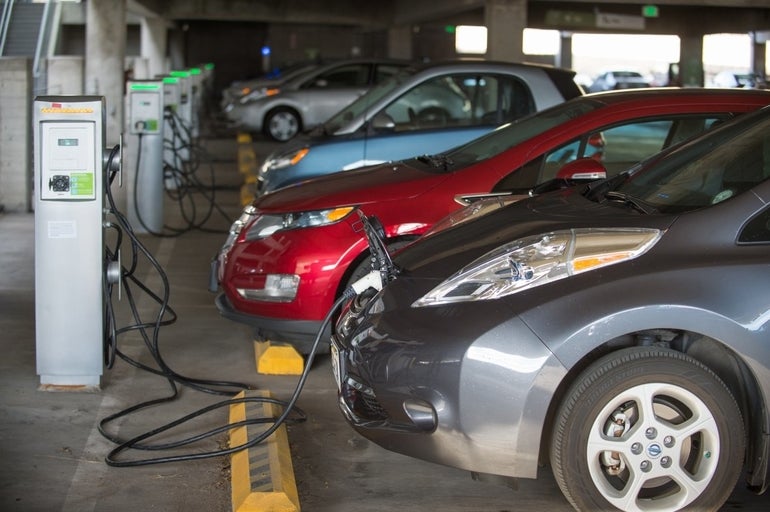After running out of road in September, a popular rebate program for the purchase of electric and plug-in hybrid vehicles will rev up again in the new year after receiving an infusion of cash through a budget signed by Gov. Charlie Baker in December.
On Wednesday, consumers became eligible for rebates of up to $2,500 for the purchase of an all-electric vehicle as part of the state’s strategy to put more low-emission vehicles on the road.
The rebate program, known as MOR-EV, was cancelled by the Baker administration on Sept. 30 because it had run out of money, but is being revived after the Legislature made $27 million available for rebates over the next two years.
The funding comes to the state through the Regional Greenhouse Gas Initiative, which is a multi-state cap-and-invest program to lower emissions from power plants, and was authorized by the Legislature as part of the end-of-year budget to close the books on fiscal 2019.
“It is a pretty significant infusion for the program and we’re going to continue to look at ways to utilize that funding for electrification,” said Department of Energy Resources Acting Commissioner Patrick Woodcock. “We’re really encouraged about this development and hopefully this will be meaningful for people considering an electric vehicle as part of their New Year.”
Consumers beginning Wednesday will be eligible for a rebate of $2,500 on the purchase of an all-electric vehicle or $1,500 for a plug-in hybrid with a range of at least 25 miles on a battery charge. The vehicle must also have a sticker price under $50,000.
The re-start of the program marks the return of rebates on plug-in hybrids and an increase in the rebate on all-electric vehicles purchases.
“We started to see a huge increase in popularity back in 2018 so we had to put some limits on the program. With this funding, we’re excited about expanding it back to these vehicles,” Woodcock said.
Woodcock said the inclusion of plug-in hybrids in the program will hopefully make those low-emission vehicles more attractive to drivers in rural parts of the state who worry about the range of the car.
Since the MOR-EV program started in 2014, the state has given out more than $31.2 million in rebates for the purchase of 15,421 vehicles. Tesla has been the top manufacturer of vehicles purchased in Massachusetts with a rebate, followed by Chevrolet, Toyota, Nissan and Ford.
In 2018, 6,098 electric vehicles were purchased with $13.1 million in rebates.
Woodcock said it’s unclear how long the $27 million will last, but suggested that at the program’s peak the state was receiving between $1 million and $1.2 million in rebate requests per month.
The price of electric batteries has also fallen, and Woodcock said manufacturers are planning to introduce a number of new models in 2020 and 2021 at prices that should be more attractive to consumers.
Massachusetts and seven other states in 2013 committed to putting 3.3 million zero-emission vehicles on the street by 2025, but the state has significantly trailed its 300,000-vehicles target under that agreement.
“We were behind, although if you do an outlook for 2025, we are seeing the kind of growth that is encouraging, but we would have to see it annualized to meet the 2025 levels,” Woodcock said.
With Massachusetts pursuing a multi-state compact separate from RGGI to drive down emissions from the transportation sector, environmental officials could see another big infusion of money to invest in electric vehicle infrastructure beginning in 2022.
Woodcock said it was premature to consider how the Transportation Climate Initiative might impact the MOR-EV program or overall growth in electric vehicle sales, but he said the administration is hopeful that the rebates will be an effective tool.
“The end goal is emission reduction in the transportation sector and what are the right policies to promote adoption of low-emission vehicles,” he said.
When the administration announced in June that it would only be extending the rebate program through September, environmental groups were critical.
The Legislature had rejected amendments to the annual budget that would have provided more funding for the five-year-old program, and officials from the Acadia Center and Conservation Law Foundation were calling on public officials to find new sources of funding.
“Eliminating the program without providing alternatives takes away needed resources and threatens to set us back in reaching our climate goals,” Amy Laura Cahn, director of CLF’s Healthy Communities and Environmental Justice program, said at the time.
Baker refiled the request for additional funding in September as part of a surplus spending bill to close out fiscal 2019. That budget bill was finalized in December, enabling the state to restart the MOR-EV program.

